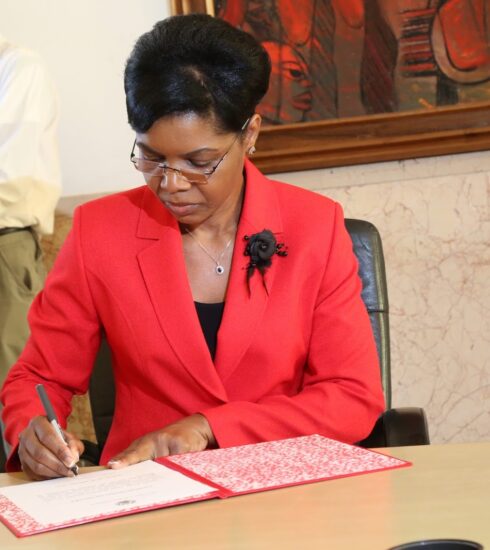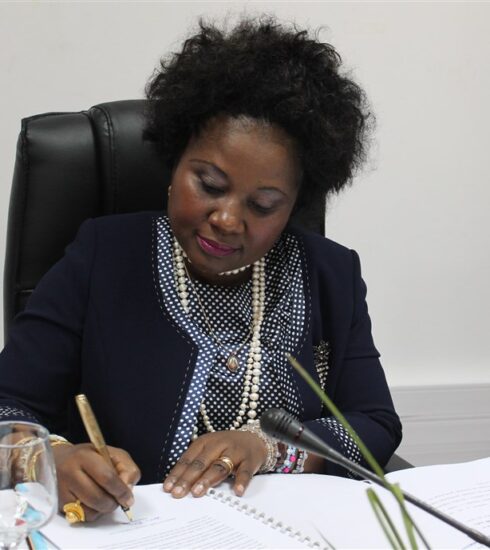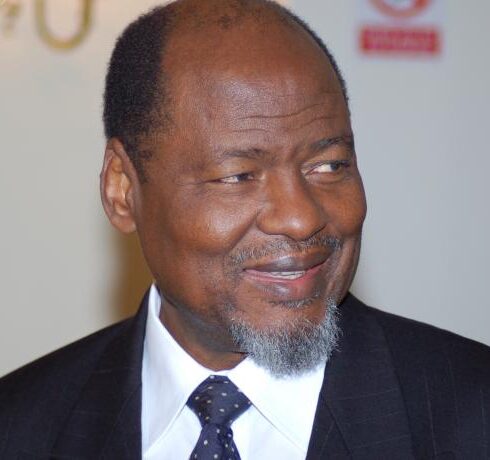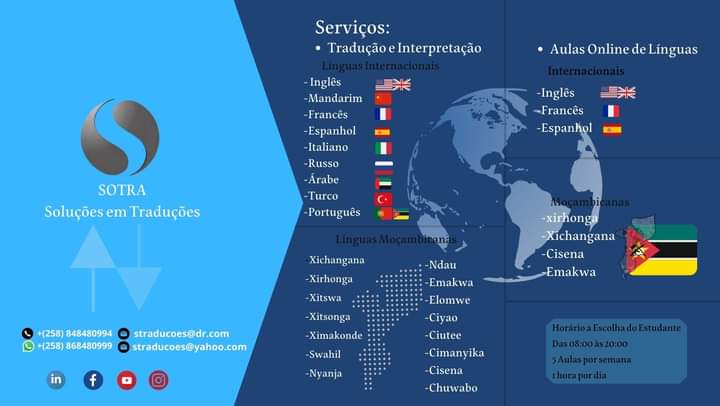
Luísa Diogo
It was supposed to have been born in a health post because she was the daughter of a nurse, João Dias Diogo, but no! Her birth did not happen in the maternity ward. Laura Diogo gave birth on a rice field in the rural area of Mágoè on the Nhalutcena plain in the province of Tete on April 11, 1958.
The newborn daughter was given the name of Luísa Dias Diogo. It was in Tete, where she spent her childhood kidding with closest friends. Then she began her studies and at that time she began to dedicate herself to domestic work as well, because the mother taught her that a woman to be appreciated in society must have twice capacity of man.
Later, the father was transferred to Maputo and took his family with him. At that time, Luísa realized that in order to achieve her life’s purpose it was necessary to work hard and take the lead. And the best way was to get money, “without money, you can express yourself but you don’t do anything.” It is in this context that she falls in love with Economics and chooses to study Accounting at the Commercial School of Maputo, a course that ended successfully in 1979.
After completing technical education, she achieves to admit at Eduardo Mondlane University (UEM), where attended the Economics course. During this period she was recruited into the army. Luísa fulfilled the politico-military training and later was demobilized and integrated in the Ministry of the Finances, where already she was trainee.
The young woman was admitted as technical of the Department of the Economic and Investment Sectors. At the academic level, in 1983 she obtained a bachelor of Economics degree by UEM, and in 1992 she obtained a licentiate degree in the same area, by the same university institution. And then she attended distance education for the Master degree of Financial Economics at the University of London.

Ads.
But before conquering academic degrees at the level of higher education, there was a historic year for Luisa. It was 1981. It was in that year that she had the pleasure of being a mother: “It was an indescribable feeling, a sense of full accomplishment. To look at that miracle of nature and say I born him …” It was also in 1981 that she married with Albano Silva.
At the professional level, after joining the ministry, she registered a fleeting rise: in 1984, she became deputy head of the Department of Economic and Investment Sectors; two years later, she became the head of the Budget Department of the Ministry of Finance; and from 1989 to 1992, she assumed the position of National Director of the Budget.
The interval between 1980 and 1992 marked the end of one economic system and the beginning of another. It was during the 1980s that Mozambique introduced programs for economic reform, that is, the change of the socialist system, with a Marxist orientation, to capitalism, which lasts until today. And it was in 1992, which ended the bloody civil war that for 16 years devastated the country.
Luísa Diogo accompanied the main reforms and economic transformations of Mozambique, at a time when the emancipation of women was not as significant as it is today. And during the period was awarded three times the Socialist Emulation Prize, in the ministry.
Between 1993 and 1994, she was Program Officer of the World Bank in Mozambique, replacing the World Bank representative several times in the country. She has participated in several negotiations with international organizations, as well as in various courses, seminars and conferences at national and foreign levels; cooperated in analyzes on sectorial development policies and also collaborated in the elaboration and evaluation of investment projects in many sectors.
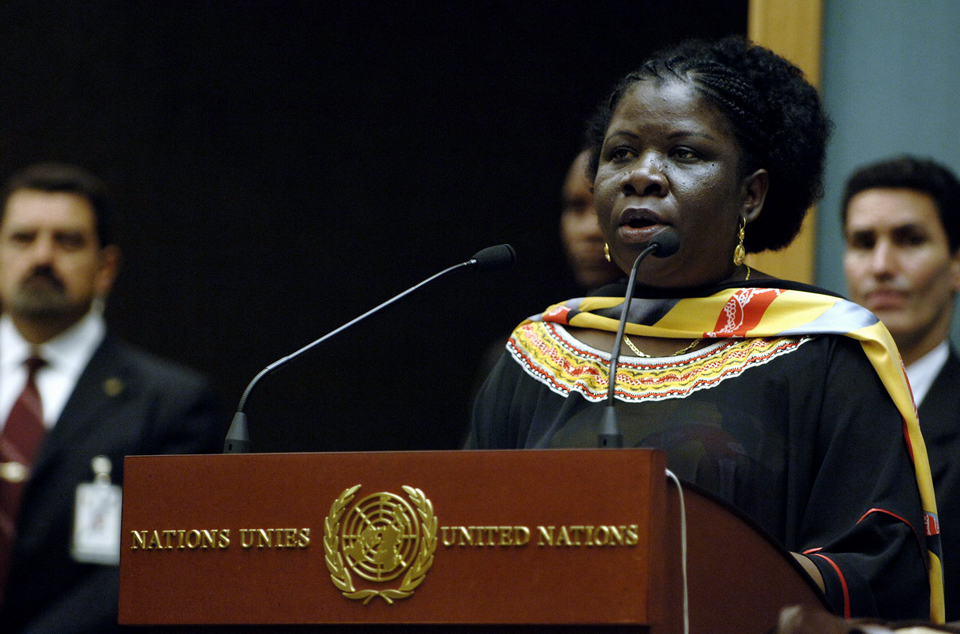
03/07/2006 – GENEVE – SUISSE- Ms Luisa Dias Diogo, Premier Ministre du Mozambique lors de l’ouverture du Sommet ECOSOC. Photo UN / Jean-Marc FERRE ,
A few days, after giving birth to her third luck (Laura), she took up office as deputy minister of the Ministry of Finance and Planning. This was after Joaquim Chissano won the 1994 elections, the first multiparty party in Mozambique.
The vote was held two years after the Rome Accords, signed on October 04 by the President of the Republic, Joaquim Chissano, and Afonso Dhlakama, leader of Renamo which at the time was considered a rebel movement. Under the agreements, the government came to recognize Renamo as a party, two years after it approved a new constitution that opened space for other parties to participate in governance. Thus, the conditions for holding the elections were already established.
At the time, Luísa Diogo was the only woman in the Government. So she decided to make a difference in her dress, avoiding the European facts of skirt and coat, adopting something simple and practical – African facts (a kind of dressing gown, made with a fabric covered with African designs or colors).
Her assistant asked, “Where will we find the clothes?” And Luisa calmed her down and took charge by the designs of clothes. In addition to wanting to show a new style, the choice was strategic. She had just had a cesarean section, and had breasts full of milk, which did not allow her to wear clothes that would tighten. Over time, the African costume became her trademark.
During that period, Luísa’s ministry was the key, because Chissano had two main goals of governance: economic and social reconstruction of the country.
In the second mandate of Chissano, Luísa Diogo took the position of minister of the same ministry. He spent four years at the position. In February 2004, Pascoal Mocumbi was exonerated from the position of Prime Minister, and the economist was appointed to the position.
Luísa Diogo became the first woman to lead the Government in the history of Mozambique. She provisionally accumulated that position with that of the Minister of Finance and Planning, until the 2004 elections.
The third vote was won by Armando Guebuza, who became the President of the Republic. Guebuza appointed Luísa Diogo to the position of Prime Minister, a position she held until the end of the mandate (January 16, 2010).
Two years later, Luísa Diogo was named Chairman of the Board of Directors (PCA) of Barclays Mozambique bank. The trust was deposited at a time when the institution was implementing an ambitious program of competitive repositioning and modernization, in order to respond to the opportunities offered by the national economy.
The following year, she published a book entitled “A Sopa da Madrugada”, 208 pages, which reports of the experience of governance in high government positions from 1994 to 2009.
In 2014, Luísa Diogo became the first woman, who was closer to becoming President of Mozambique. The economist lost in the second round of her party’s internal elections, having been overtaken by Filipe Nyusi, who would win the general elections in 2014, becoming the fourth president in the history of Mozambique.
Currently, Luísa Diogo is, in addition to PCA of a bank, mother of four, Nelson, Nuno, Laura and Luísa, the latter was adopted. To find out how her marriage with the lawyer Albano Silva it is, just pay attention to the right wrist and count the number of bracelets, as her husband offers one of gold bracelet each day that complete another year of marriage.
Bibliographic References
Porto Editora, 2003-2016. [consult. 2016-05-03 22:49:22]. Available on the Internet: http://www.infopedia.pt/$luisa-diogo
“Mulher cristalina e idolatrada”. ÍDOLO [city of Maputo] June 2011: pag. 23-32. Printed.
A Verdade, 2016 [consult. 2016-05-06 22:20:35] Available on the Internet: http://www.verdade.co.mz/tema-de-fundo/35/44438
Barclays, 2004-2016. [consult. 2016-05-06 22:26:35] Available on the Internet: http://www.barclays.co.mz/Sobre-Nos/Membros-do-Conselho-de-Administracao







